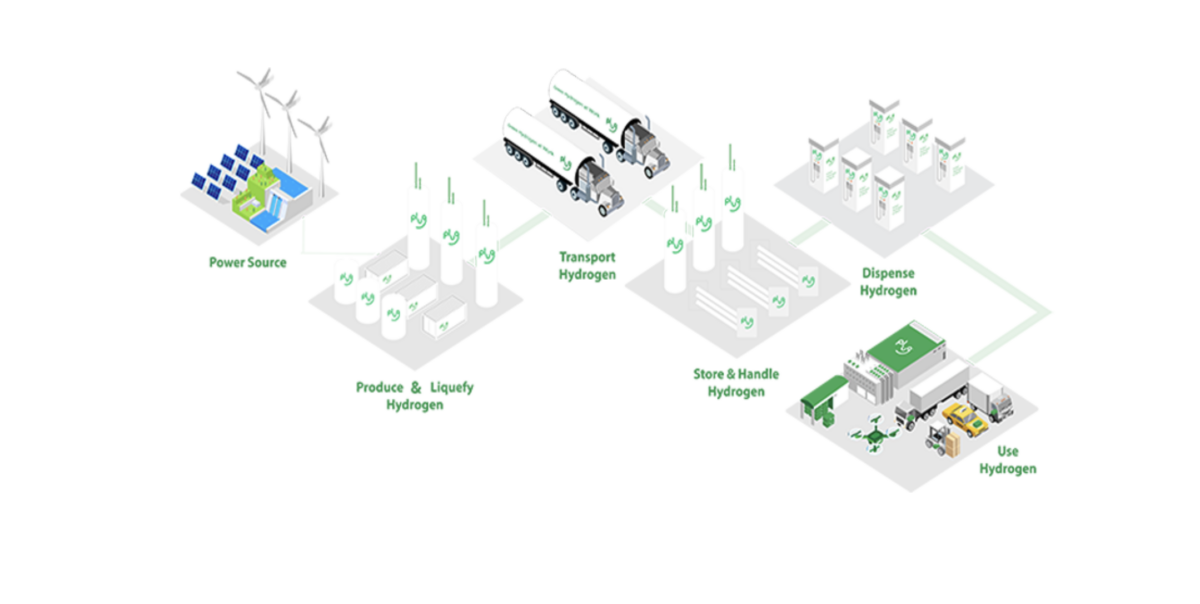Plug Power has commissioned a 1 MW electrolyzer system at an Amazon fulfilment center in Aurora, Colorado. The proton exchange membrane (PEM) electrolyzer is the first for Amazon and is producing hydrogen to fuel more than 225 hydrogen fuel cell-powered forklift trucks at the site. The hydrogen will be compressed on site and will be stored in a gaseous hydrogen storage tank. Plug Power has collaborated with Amazon to deploy more than 17,000 fuel cells to replace batteries in forklifts in more than 80 fulfilment centers in North America. “For most of these locations, hydrogen to power the forklifts is produced elsewhere, liquified, and delivered by trucks to an on-site storage and dispensing system,” said Plug Power.
The US government has announced $623 million in grants to build electric-vehicle (EV) charging networks and hydrogen fueling infrastructure in urban and rural communities across the United States. In particular, it will allocate $70 million to build up to five hydrogen fueling stations for medium- and heavy-duty freight trucks in Texas, in the Dallas-Fort Worth area, Houston, Austin, and San Antonio. “The project will help create a hydrogen corridor from southern California to Texas,” said the US Department of Transportation.
Hexagon Purus has raised approximately NOK 1 billion ($95.7 million) from strategic investors Mitsui and Hy24. “The proceeds will support Hexagon Purus's growth strategy, including its ongoing global capacity expansion program,” said the Norwegian company. The five new production facilities are in the US state of Maryland, the Canadian province of British Columbia, Germany, and China. In addition, the company plans to open a new site in Dallas, Texas, in 2024.
H2 Energy Europe has secured environmental approval for a large-scale green hydrogen production facility in Esbjerg, Denmark. “This achievement marks a significant milestone for the project, bringing it closer to a Final Investment Decision (FID),” said the Zürich-based company, explaining that the pipeline is set for completion by 2028. According to Jesper Frost Rasmussen, the mayor of Esbjerg municipality, the development sends a message to green energy companies, demonstrating that private investors can secure approvals for their projects and are prepared to start construction of large-scale hydrogen facilities. The facility will produce surplus heat, which has the potential to supply the majority of households in Esbjerg with district heating.
Popular content
ArcelorMittal Bremen and energy service provider EWE have signed a letter of intent to jointly develop hydrogen production projects for green steel manufacturing. In April 2023, ArcelorMittal Bremen, EWE, and a subsidiary of EWE, SWB, started working on a 10 MW hydrogen production plant in Bremen, Germany, which is due to go into operation this year. “We want to use hydrogen instead of coal as a chemical reducing agent and thus further reduce CO2 emissions towards net zero,” said Frank Hohlweg, chief operating officer for ArcelorMittal Bremen. “Until green hydrogen is available in sufficient quantities and at competitive prices, we are planning to use natural gas in the transition phase.”
The German state of Saxony and the Czech Republic have signed a letter of intent to cooperate on the development of a hydrogen infrastructure and the use of hydrogen. “The plans include the establishment of a cross-border hydrogen network and the promotion of cooperation and exchange between German and Czech research institutions and companies,” said the government of Saxony. The two countries have agreed to convert existing natural gas pipelines to hydrogen. “This should ensure the supply of large quantities of hydrogen from Eastern and Southern Europe at low cost by 2029, if possible.” Poland, as an important trading partner, is likely to engage in new hydrogen projects with Germany, given the Polish government's new green approach, said Saxony Economics and Transport Minister Martin Dulig.
This content is protected by copyright and may not be reused. If you want to cooperate with us and would like to reuse some of our content, please contact: editors@pv-magazine.com.


By submitting this form you agree to pv magazine using your data for the purposes of publishing your comment.
Your personal data will only be disclosed or otherwise transmitted to third parties for the purposes of spam filtering or if this is necessary for technical maintenance of the website. Any other transfer to third parties will not take place unless this is justified on the basis of applicable data protection regulations or if pv magazine is legally obliged to do so.
You may revoke this consent at any time with effect for the future, in which case your personal data will be deleted immediately. Otherwise, your data will be deleted if pv magazine has processed your request or the purpose of data storage is fulfilled.
Further information on data privacy can be found in our Data Protection Policy.